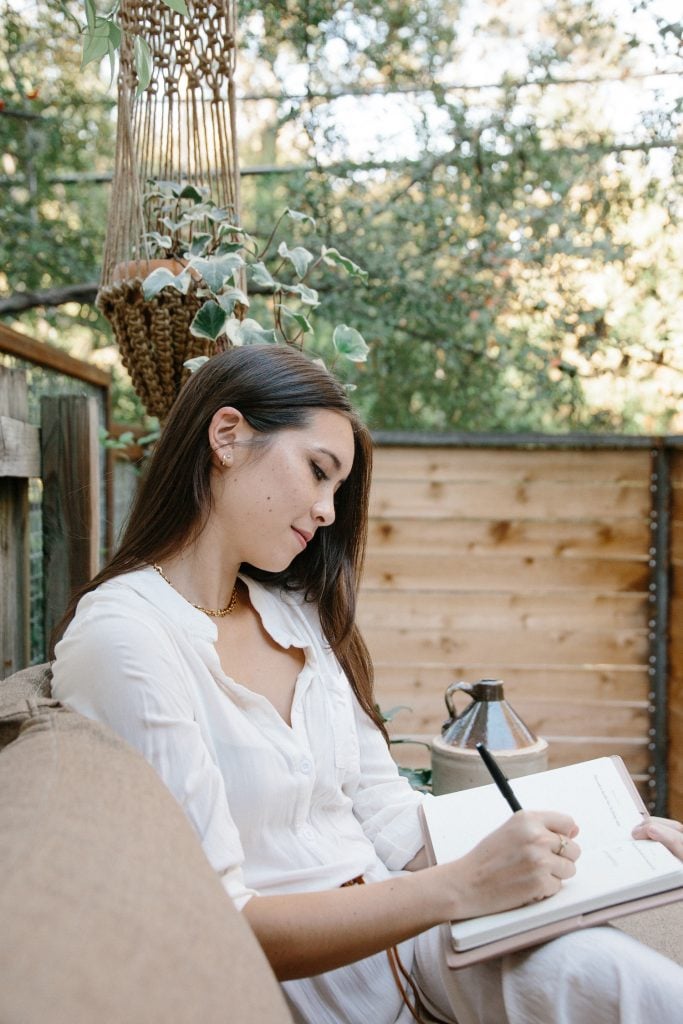It was a painful moment. I was sitting on my living room floor, my puppy curled by my leg, when I hit send. I’d been thinking about that email for days, spinning over a choking feeling of overwhelm. I need to re-home my puppy, the email read. I have too much on my plate.
This memory scratches my heart. It wasn’t the request in the email (which landed in the inbox of a handful of friends). People re-home their dogs. It happens. What makes me shiver is how in my frantic quest to beat my feeling of overwhelm, I failed to consider what gave me joy and instead acted on impulse. I was tired and depleted, searching for a quick fix when I needed to take a minute and reassess what I was juggling in my life.
Featured image by Riley Blanks Reed.


Before I continue, I’ll tell you that my puppy is curled next to me as I write this. I didn’t let go of her. But that moment was a pivot point. How did I let my life get to a point where I was so maxed, I was willing to consider giving her away?
The wild truth is that I am not alone. Study after study today shows that at least 50 percent of us feel stressed or, even more so, overwhelmed by life on any given day.
How to Beat the Feeling of Overwhelm
In the two years since sending that email, I’ve become razor sharp about how I spend my time. I aim to only allow the essential to fill my plate so there’s room for joy and simply being.
Yes, I admit: Writing this conviction is a whole lot easier than employing it. Still, I’ve gathered an arsenal of strategies over the past few years that have helped. I’ve read, gleaned, studied, obsessed over, and interviewed some of the most compelling thought leaders about time management, beating overwhelm, and prioritizing joy.
Here are the three most life-stretching tips from those thought leaders that helped me beat that feeling of overwhelm.
#1: Reframe To-Do Lists as Menus
The daunting list. It rules our lives. A grocery list, a task list, an errands list: They’re all a series of things to check off, conquer, and get through. In honesty, I love lists. But it wasn’t until I came across Oliver Burkeman’s brilliant spin on them that I finally began to see beyond the lines: “Spending your days trying to get through a list of things you feel you have to do is a fundamentally joyless and soul-destroying way to live,” writes the productivity expert.


Whoa. It gets better. Burkeman offers a reframe: “What if we understood our lists as menus?”
This approach helps us see that we have choices in our lives. We get to do things, and when we mindfully and smartly opt for the ones we want (or will benefit us), we are happier. Yes, there are tons of things to choose from on a menu. But that very abundance presents the beauty of it all, believes Burkeman. “Increasingly, I find myself treating my list of work projects as a menu, too,” he writes. “The contents of the menu is constrained by various goals and long-term deadlines, to be sure. But the daily practice is to pick something appetising from the menu instead of grinding through a list.”
I’d used this reframe when I decided not to give up my puppy. I get to keep her I think. I choose to care for her. Burkeman’s approach helps me see how joyful it is to view what comes into our lives as items of potential fulfillment that we have the agency to pick from.
#2: Design Your Ideal Day
When I felt overwhelmed several years ago, I existed in a narrow tunnel each day. I let things happen to me, like too much demanding work, others’ needs, and the day-to-day grind. Doing this put me in a victim place. To switch this, I practice a simple morning technique Hugh Jackman revealed to Tim Ferriss several years ago: design your day. The actor admits he’s always been primed to be overworked and writes out how his day will unfold every morning. He visualizes himself at the end of the day, reflecting on how he felt, what he did, who he connected with, and what he accomplished. “I do that every morning on a text, which I send to [my wife] Deb,” he told Ferriss. “I keep myself accountable to what I was trying to manifest.”
These days, I write down not what I must do but what I’ve had the joy and privilege of accomplishing that day. I may jot down something like, I had an incredible day, wrote five pages of my book, took Andi (my dog) for a long walk, and had a delicious dinner with (my boyfriend) Christian. Every time I ‘design my day,’ as Jackman describes, I think of my future self and how she feels.
Jackman says doing this helped him listen to his intentions. I can attest to this working. We can hope for great days all we want, but if we don’t focus on the actions and specifics of those dreams, they will (likely) not happen. However, if we visualize a beautiful day with conviction, we increase our chances of it all unfolding.


#3: Be Still with Yourself
My greatest takeaway from Burkeman and Jackman is their spotlight on choice. Each of us has agency in our lives. Knowing this truth has nourished my strength and solace.
My brilliant friend George Mumford, a psychologist and sports performance expert, has further drilled this home for me. In my conversations with Mumford, many of which have focused on how to beat overwhelm, he’s told me that we can choose how to respond to everything in our lives. The most potent way to do this is to start by taking a moment of stillness before we respond.
Each of us has agency in our lives. Knowing this truth has nourished my strength and solace.
Digging a little deeper: When we react quickly to a fact or situation, we rob ourselves of any room between the stimulus (what is happening at that moment) and our response. I did this on that fretful day I considered rehoming my dog. I reacted and didn’t take a moment to be still. Mumford says when we pause before responding, however hard it may be, we reclaim our power and integrity.
There’s such beauty in checking in with ourselves, which Mumford calmly reveals in this video. He says we each have a still voice deep within, a source of tremendous wisdom and insight.
When we tap into that, we close the space for overwhelm and open new portals for joy.





